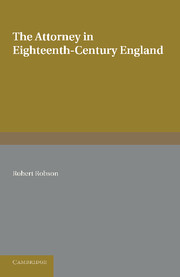Book contents
- Frontmatter
- Dedication
- Contents
- General Editor's Preface
- Preface
- Chapter I Attorneys and Solicitors Before 1700
- Chapter II Regulation of the Profession
- Chapter III The Society of Gentlemen Practisers
- Chapter IV The Provincial Law Societies
- Chapter V The Making of an Attorney
- Chapter VI The Attorney in Local Society
- Chapter VII Estates and Elections
- Chapter VIII Administration and Finance
- Chapter IX Two Attorneys
- Chapter X The Road to Respectability
- Appendix I The Apprenticeships of Richard Carre and Samuel Berridge
- Appendix II The Admission of an Attorney
- Appendix III Christopher Wallis: Notes from the Journal
- Appendix IV A Note on Numbers
- Appendix V The Professions in the Eighteenth Century: a Bibliographical Note
- List of Primary Sources
- Index
Appendix II - The Admission of an Attorney
Published online by Cambridge University Press: 05 June 2016
- Frontmatter
- Dedication
- Contents
- General Editor's Preface
- Preface
- Chapter I Attorneys and Solicitors Before 1700
- Chapter II Regulation of the Profession
- Chapter III The Society of Gentlemen Practisers
- Chapter IV The Provincial Law Societies
- Chapter V The Making of an Attorney
- Chapter VI The Attorney in Local Society
- Chapter VII Estates and Elections
- Chapter VIII Administration and Finance
- Chapter IX Two Attorneys
- Chapter X The Road to Respectability
- Appendix I The Apprenticeships of Richard Carre and Samuel Berridge
- Appendix II The Admission of an Attorney
- Appendix III Christopher Wallis: Notes from the Journal
- Appendix IV A Note on Numbers
- Appendix V The Professions in the Eighteenth Century: a Bibliographical Note
- List of Primary Sources
- Index
Summary
IN his Memoirs William Hickey describes very vividly the way in which he was examined and admitted as an attorney before leaving London for Jamaica in 1775. Mr Justice Yates, one of the judges of the Court of King's Bench, and an old friend of his father's, had promised to sign the fiat. He invited Hickey to breakfast so that he could be examined as to his being ‘equal to the practice of an attorney’, and was told to send his articles in advance to Yates's clerk. Hickey goes on:
At the time appointed I attended, and in a terrible fright I was at the ordeal I imagined I had to pass through, and the probable loss I might be at in answering some of the many questions I understood would be put to me upon points of practice. Being conducted into his parlour where the breakfast things were all arranged, in five minutes the Judge entered. We sat down, and he recommended his French rolls and muffins as of the best sort, but so predominant were my fears about the dreaded examination that I had no inclination to eat. Breakfast being over, he asked me how I liked the Law, how long I had been out of my clerkship, and two or three other questions equally unimportant, when a servant entered to announce the carriage being at the door, whereupon he desired his clerk to be called, upon whose appearance he enquired whether Mr Hickey's Certificate was ready. The clerk having it and other papers in his hand, the Judge took it from him, and after perusal subscribed his name, and then said, ‘ Now, Mr Hickey, if you will be so good as to accompany me to Westminster Hall, I will get you sworn, and the business concluded.’ I accordingly stepped into his coach which conveyed us to Westminster, and immediately going into Court, where he had taken his seat upon the Bench, the proper officer was asked whether he had the roll, and answering in the affirmative my Certificate was delivered to him and read as was also an affidavit of my Master Mr Bayley's.
- Type
- Chapter
- Information
- The Attorney in Eighteenth-Century England , pp. 159 - 161Publisher: Cambridge University PressPrint publication year: 2013

